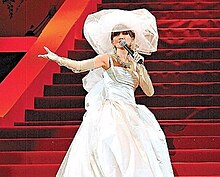Anita Mui
| Anita Mui | |||||||||||||||||||||||||||||
|---|---|---|---|---|---|---|---|---|---|---|---|---|---|---|---|---|---|---|---|---|---|---|---|---|---|---|---|---|---|

Mui at the "Anita Classic Moment Live 2003" concert in the Hong Kong Coliseum
|
|||||||||||||||||||||||||||||
| Background information | |||||||||||||||||||||||||||||
| Chinese name | 梅艷芳 (traditional) | ||||||||||||||||||||||||||||
| Chinese name | 梅艳芳 (simplified) | ||||||||||||||||||||||||||||
| Jyutping | Mui4 Jim6-fong1 (Cantonese) | ||||||||||||||||||||||||||||
| Born |
10 October 1963 Mong Kok, British Hong Kong |
||||||||||||||||||||||||||||
| Died | 30 December 2003 (aged 40) Hong Kong Sanatorium & Hospital, Happy Valley, Hong Kong |
||||||||||||||||||||||||||||
| Resting place | |||||||||||||||||||||||||||||
| Other name(s) |
|
||||||||||||||||||||||||||||
| Occupation | Singer, actress | ||||||||||||||||||||||||||||
| Genre(s) | Cantopop | ||||||||||||||||||||||||||||
| Instrument(s) | Vocals | ||||||||||||||||||||||||||||
| Voice type(s) | Contralto | ||||||||||||||||||||||||||||
| Label(s) |
Capital Artists (1982–2000) Music Nation Group (2001–03) |
||||||||||||||||||||||||||||
| Years active | 1982–2003 | ||||||||||||||||||||||||||||
| Partner(s) | |||||||||||||||||||||||||||||
| Parents | Tam Mei Kam (mother) | ||||||||||||||||||||||||||||
| Ancestry | Hepu, Guangdong (also known as Hepu, Guangxi) | ||||||||||||||||||||||||||||
| Influenced | |||||||||||||||||||||||||||||
|
Awards
|
|||||||||||||||||||||||||||||
Anita Mui Yim-fong (10 October 1963 – 30 December 2003) was a Hong Kong singer and actress. During her prime years, She made major contributions to the Cantopop music scene while receiving numerous awards and honours. She remained an idol throughout most of her career, and was generally regarded as a Cantopop diva. Mui once held a sold-out concert in Hammersmith, London, England, where she was dubbed the "Madonna of Asia" (東方麥當娜), which brought her to further international fame. That title stayed with her throughout her career, and has been used as a comparison for both Eastern and Western media.
In the 1980s, the gangtai style of music was revolutionised by Mui's wild dancing and on-stage femininity. She was famed for her outrageous costumes and high-power performances in combination with contralto vocals, which are rare in female artists. Her fan base reached far beyond Hong Kong into many parts of Asia, including Taiwan, mainland China, Singapore and Malaysia, and other countries as well. In the Hong Kong entertainment industry, where stars often rise and fall quickly, Mui remained in the spotlight for 21 years (1982–2003). Her career came to a halt abruptly in 2003 when she announced that she had cervical cancer. She died later that year at the age of 40. Her continuing commemoration by the Hong Kong entertainment industry was due not only to her music and film legacies, but also her involvement in charity and humanitarian work.
Mui experienced much hardship in her childhood. She was the youngest daughter in a family of four children. Her elder sister, Ann Mui, was also a singer. The children were raised in a single parent family. In some of her interviews, Mui mentioned that she had never met her father. This meant that she had to help provide for her siblings at an early age, dropping out of school at the age of 13 or 14. More hardship followed the family when the bar that her mother ran was destroyed by a fire. To make a living, Mui entered the show business at around the age of four with her sister Ann. She performed Chinese operas and pop songs in theatres and on the streets. Both Mui and her elder sister Ann performed in practically any nightclub that offered them a chance to make a living. At the age of 15, due to the frequency of performances at different venues (up to six venues per day) that she had, her voice was affected due to the development of nodules on her vocal chords. Following the advice of the doctor, she took a year off and to keep herself occupied, she attended art lessons with her cousin. After a year, she started performing again despite the change in her vocal range, which lowered her voice by an octave (eight keys). Her newly found distinctive voice became an important trademark in her entire career.
...
Wikipedia
